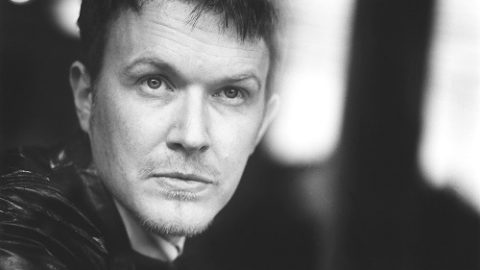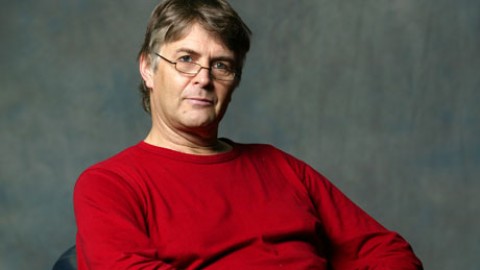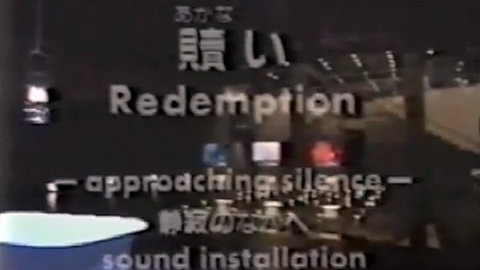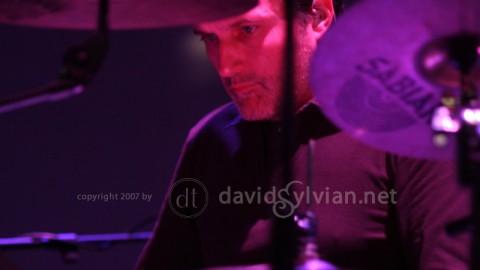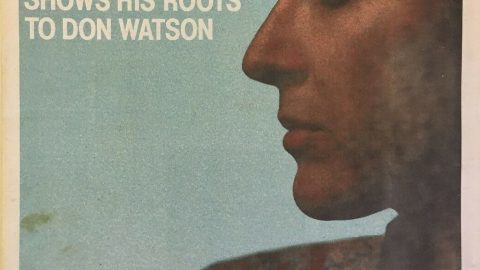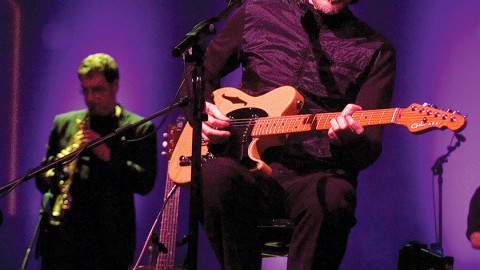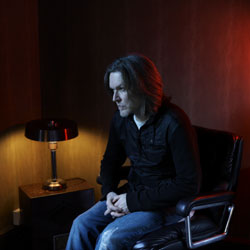
David Sylvian was answering questions posed by MusicOMH.com’s Jude Clarke.
Originally published on musicomh.com, but currently defunct.
David Sylvian has had one of the most interesting and divergent careers of any musician over the the last 30 years. From the early, New York Dolls-apeing days of Japan, through to their 1980s “cerebral teen idol” success, he then morphed into a thoughtful and at times challenging solo artist.
Also latterly known for the series of collaborative works, produced over the years with musicians such as Ryuichi Sakamoto, Can‘s Holger Czukay, Robert Fripp, Talvin Singh and most recently some key improvisors like Christian Fennesz, Eddie Prevost and Evan Parker, Sylvian has consistently avoided the obvious and sought out the esoteric, to unfailingly fascinating effect.
Since we last spoke to him, back in 2005, Sylvian has produced a “site-specific” ambient composition When Loud Weather Buffed Naoshima (to accompany an installation piece by the Naoshima Fukutake Art Museum Foundation), worked on his Nine Horses project with brother and former Japan drummer Steve Jansen, and given us 2009’s terrific, stark and sparse Manafon. This year has seen the release of Sleepwalkers, a compilation of remixes of some of his recent works. So it seemed a good time to check in with him again to discuss these and other aspects of his long and itinerant creative life.
musicOMH: Over the course of your career you’ve worked with such a wide range of musicians – as on your latest release, Sleepwalkers. Do you seek out those that you want to work with, or do they approach you?
David Sylvian: If it’s a solo project I’ll tend to seek out the musicians I’ve curated in my mind as being ideal for the project but there are exceptions to that rule.
When working on Blemish I wanted to work with someone exploring the latest in virtual filtering systems but I’d failed to find a musician that echoed my own aesthetic. Whilst recording the album Christian Fennesz got in touch with me regarding some work he wanted my involvement in and so, in a roundabout way, I found who I was looking for. Christian worked on a pivotal track on Blemish, A Fire In The Forest.
On other occasions individuals reach out to me with potential ideas or actual material on which to collaborate. The title track for Sleepwalkers came about in that fashion. Martin Brandlmayr sent me some material from which to select possible pieces on which to work. I chose this one composition, Martin did a little more work on it, sent multiple files to me, I completed the arrangement and produced the final mix.
Other musicians that have approached me at some point over the last decade or so, the results of which appear on Sleepwalkers, include Chris Vrenna and Readymade FC, but most of the collaborations are ongoing concerns originally established at an earlier point in time.
OMH: Could you tell us a little bit about how the collaborative process works? Do you use a tried-and-tested method, or is it driven by the different dynamic between you and each artist? Which collaborations have been particularly rewarding, and which the most challenging or difficult?
DS: Very often you’re working alone with files that have been sent to you and the response to a particular piece tends to be fairly intuitive. Much of the writing in this instance tends to be undertaken whilst traveling. Lyrics scrawled on the backs of envelopes and receipts, anything I can get my hands on whilst driving.
If the material in question appears to be taking you into unfamiliar territory that’s always of interest, or it could be a different slant on someplace you’ve traveled before or alternately it affords an opportunity to inhabit or express a part of your psyche that doesn’t tend to get much of an airing in one’s own work.
On my last album, Manafon, all of the basic tracks were improvised live with ensembles in Vienna, Tokyo, and London. My response to these recordings was tackled at a later date but with the imposed discipline of working with a form of automatic writing. So, once the writing of lyric and melody were underway the piece would be completed within a matter of hours from writing through to recording the master vocal with little or no time for revision etc. All of this would take place in the studio of course.
The rewarding aspect of collaborative work is that it tends to lead you out of your comfort zone into territory in which you don’t have a sure footing. You’re afforded a challenge of an entirely different nature than when working alone perhaps. In long standing relationships there’s a keen awareness for the need of an advance or evolution to take place, of redefining common ground in an attempt to diversify and give character to a particular project. In a sense it has to justify its existence as in ‘why this direction now with this particular constellation of players’? Difficulties aren’t that common, not if you’ve chosen your partners well, but it can happen that working methods don’t compliment one another, that there’s a difference of opinion as to where the work can or should be heading. This is less likely to happen when exchanging files although it has been known to. Robert (Fripp) and I had fairly different approaches to recording which hindered our progress to some extent. We found we were rarely together
in the studio, working at different hours of the day or night for differing durations.
OMH: We heard that you are at the beginning of a collaboration with Dai Fujikura, both in the new track Five Lines on Sleepwalkers and on a series of Manafon remixes. When can we expect to see (hear) the fruits of this? What do you feel he has brought or added to Manafon?
DS: I’d anticipate this elaboration of the Manafon material will see the light in the first quarter of 2011.
Working with Orchestration, fleshing out the melodic content inherent in the vocal lines, tends to make the compositions more accessible in that people appear to have a more immediate access to, and appreciation of, the melodies etc. Contrary to a number of commentaries on the original work, Manafon wasn’t a move away from the melodic; it’s just that the structures underpinning the melodies and the melodies themselves were more complex. These new arrangements might allow greater insight into that fact.
Dai is a fascinatingly original and protean composer, so whilst the work might ultimately be more accessible, it’ll lose none of its complexity, in fact it seems to take on a richer complexity but, to Dai’s credit, that doesn’t hinder the immediacy of the finished piece. We’re working counter to my original intentions for the compositions in a similar way that my vocal contributions on the original worked counter to the intentions of the improvisations.
OMH: How easy or difficult do you find “letting go” creatively, or ceding control of your compositions to other musicians?
DS: I have a clear perspective on how I imagine I’d like to hear the finished work and very often I am the person completing the final mix (but there’s a common courtesy on fully collaborative works wherein the development of a mix is shared until all parties are more or less satisfied) but where that’s not the case I’ve ceded control because the capabilities of my partners are apparent at the outset. It’s part of what’s drawn us together if you will. There’s a shared aesthetic that gives one confidence in the outcome once the work leaves your hands. There’s been exceptions to the rule but generally when this happens it’s less likely to be a full on collaboration so much as a commission of some kind.
OMH: How has releasing through Samadhisound changed the way you create and present your music to your audience?
DS: It’s afforded me a liberty I wasn’t aware existed prior to leaving a major label. I believe that consciously or not, you tend to tailor your work to the scale in which you’re working which, with a major label, was a large-scale industry, in much the same way as in an artist presented with the Tate Modern’s Turbine Hall to fill will adjust their work accordingly. When you’re allowed to ignore the demands of scale entirely you tend to settle into what it is you’re capable of producing at a moment in time, the appropriate scale and dimensions for a given set of issues you’ve determined need addressing. There’s an uncomplicated beauty to the process of defining the right elements for a given project. Being forced by context to rise to the needs of the industry as it was wasn’t all bad of course. It kept you on your toes, forced you to remain cognizant of the commercial workings of the market whether you chose to or not, it imposed a discipline, the intensity of which was felt in relation to the heights to which one aspired.
Regardless of context though one’s mind is still never far from work. In theory you’re at work all of the time but it’s a different climate for me now. The context and momentum is of my own making. I had a fairly high degree of freedom and control when signed with Virgin, far more than my commercial standing within the company could justify, but now I have 100% control and no need to talk, will, cajole others into embracing new work in the hope they’ll put their best efforts into promoting it in the market place. The scope of activity is somewhat diminished because you no longer have this large machine presumably looking out for your best interests, promoting material the world over.
But it feels far preferable to be in the driving seat than to sit back rather helplessly and watch work virtually disappear into corners of the market for which it was never intended which in my case happened too frequently. So to answer the question as to how it’s changed the way I create music I’d suggest, if it has changed at all, it’s due to an unconscious awareness of liberty whilst at work. In truth, the advent of the internet has had a far greater impact on the way that I work than the move from major label to independent.
OMH: What do you think of the current debate around availability of music online (initiatives like Spotify, or bands giving away their albums for free, for example)? What about social networking and blogging type sites? Do you think they’ve changed the relationship between musicians and their fans? Do you use Twitter, Facebook and the like?
DS: If a musician or band give their music away it’s because they can afford to and/or it’s part of a marketing ploy related to tickets sales, media savvy etc. Most musicians don’t fall into that category and had trouble making a decent living prior to the advent of the digitally pirated copy. It would be a positive step to see companies such as iTunes protect MP3 files with the same degree of fortitude they bring to protecting MP4 files for movies and television. Up until the present time the reason it’s been so very easy to copy audio files for uploading to file sharing sites is because music was being purchased on CD or those that purchased MP3 files retained the freedom to allow them to burn their files to CD-R which really isn’t a necessary option any longer. When we download a movie or TV show via legal means, for reasons that are quite obvious, we’re not given the option of burning the file as a DVD for standard issue or Blu-ray players.
It would seem a simple step to make MP3s available for use with a registered device as is the case with movies. Up to a collectively agreed number of devices per purchase. This wouldn’t put an end to pirating of course but it might help redress the balance a little between legal vs illegal downloads. It goes without saying that this development would also signal the end of releases in a physical format such as the CD with vinyl being the possible exception.
I don’t use Twitter and personally only intermittently make postings on Facebook. Whilst being mindfully appreciative and grateful for the general level of interest in myself and the music, I find the reading of reviews and opinions of one’s self and one’s work unconstructive. It can be hard enough to open up or surrender to the creative mind without one’s own critical faculty interfering in the process yet alone hearing the echoes of many other would be critics, admiring or otherwise. It’s simply an unnatural context in which to find one’s self. It skews reality, possibly creating a lack of self-reliance, focus, possibly undermining, or leading to a false sense of conviction. Viewing oneself in a distorting mirror simply isn’t a healthy option. On the other hand, having direct access to one’s own audience is beneficial in that one nolonger relies on media interest to communicate with a particular demographic and one’s words and intentions can’t be distorted by the medium as such rather only in the hearts and minds of the recipients.
OMH: Your evolution as a musician/artist has probably been one of the most interesting and marked of the last 30 years. How do you feel about Japan (the band!), today? Which parts of that period are you most proud of? What still stands up musically, do you think?
DS: If I feel anything about the band it’s likely to be concealed beneath a haze of ambivalence which is tempered by an equally unfocused sense of gratitude and the pull of lost comradeship. It was all so long ago, other lives, other people, and I don’t have a tendency towards nostalgia. I haven’t heard the material since we last performed it around ’82 so I can only go by what I felt at that time regarding the band’s achievements and failures.
I’d imagine the last studio album to be the band’s greatest achievement as we were closer to maturity at that time. Richard Barbier and myself, complimented by co-producer Steve Nye’s discerning ear, spent many a long hour searching for, and perfecting, synthetic sounds with which to construct the largely electronic arrangements for the songs. It was a labour intensive manner in which to work that, on some days, would simply exhaust the patience of everyone in the studio but ultimately the results were very gratifying as the working method and aesthetic for the project developed over time.
Richard and I would critique and scrutinize one another’s work until all and any offending resonances or other distracting factors in the make up of a particular sound were eliminated (many other producer/artists of the time tended to employ programmers to do this job for them or simply used factory presets which was an approach we were averse to). No sequencers were used on the album so if a part was physically overly demanding to play Steve would be taught the it and, due to his capacity to play with amazing accuracy, record the part in sections. From the outset, and to a primitive click track, Steve had independently played/recorded each drum and cymbal in his kit to allow for the maximum degree of sonic control. In other words it was a well-crafted album which carved out a unique space for itself in its day but I’ve no idea if any of it stands the test of time.
OMH: If you could “have your time again”, what would you do differently?
DS: With the exception of certain individuals in my life including my children, close friends, teachers, collaborators and co-workers, just about everything.
OMH: If you had to take a job unrelated to music, what would you choose to do?
DS: That’s a question I often grapple with. I like the notion of simply working with my hands. Object making, painting etc. This might be related to the fact that the process of creating new work is less to do with playing instruments as much as it once was, or at least instruments as we once knew them to be, something more tactile in nature, physical objects that had a relationship to one’s own body etc. I’m also drawn to the occupation and seclusion of the writer.
OMH: What music has most influenced you over the years? What music have you most consistently listened to, or does it constantly evolve and change, like your own music does? Who are you listening to now?
DS: Listening habits do tend to change. I find it very difficult to go back in time and absorb myself in music that was once held dear. There used to be the ‘evergreen’ artists whom you could return to time and again such as Nick Drake, The Beatles, Caetano Veloso, Robert Wyatt, Reich, Prt, Garbarek, Miles Davis, Bill Evans etc… but increasingly I feel I can only become absorbed in that which I don’t know, am unfamiliar with. Maybe this is some kind of critical turning point in my own relationship with or to music? I can’t be certain.
OMH: Finally, what’s coming next? Are there any plans to tour either Manafon or Sleepwalkers? And who would be your ideal future collaboration(s)?
DS: I imagine I’ll continue recording new work prior to touring again although I’ve not ruled out the possibility of touring in the relatively near future. I’ve been in discussions on and off regarding live performance and what is and isn’t possible. Once I have some clear answers to specifics I’ll better determine the road ahead.
As far as collaborators go; although it might appear otherwise, I don’t tend to think along those lines. Collaborators enter the picture once I have a direction or subject matter in mind then, slowly, pieces of the puzzle fall into place. I expect to work on a more expansive project with Dai in the not too distant future. Joan Wasser and I have spoken of writing together. Steve, Burnt Friedman and I are still looking for common ground for a possible second Nine Horses album, but in the meantime I’m quite happy to work on the next solo album, the feel for which is beginning to take shape.
OMH: Thank you for your time.
DS: Thank you.


